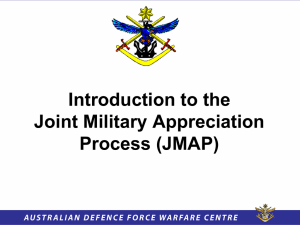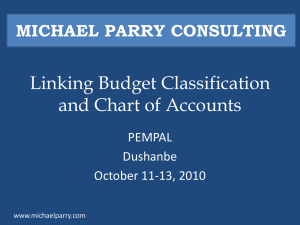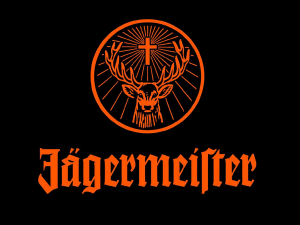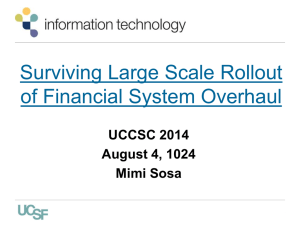Decisive Event Planning
advertisement
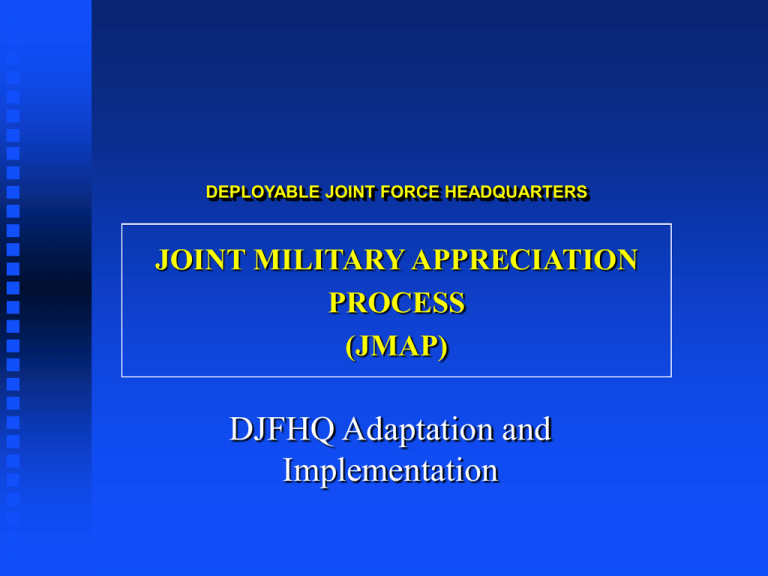
DEPLOYABLE JOINT FORCE HEADQUARTERS JOINT MILITARY APPRECIATION PROCESS (JMAP) DJFHQ Adaptation and Implementation Why Bother * I don’t work at this level. * I’m in a Service or Unit that doesn’t use this process for very good reasons. * It’s just more bloody theory anyway - only ever used at Training Institutions. Why Bother * Well it isn’t just theory any more. We are in the busiest operational planning period of my career. * Similar processes are used by Defence Forces around the world. * You must certainly modify it to suit your purposes but directions you are likely to receive have been formulated using this process so it best to get to grips with it. I promise: * As little doctrine as possible. * Personal views based on either operations or major exercises. * A joint perspective. A lecture is the process by which the notes of the lecturer become the notes of the students, without passing through the minds of either. R.K. Rathburn An expert is one who knows so much about so little that he can neither be contradicted, nor is worth contradicting Henry Ward Preliminary Scoping STEP 1: MISSION ANALYSIS JMAP Comd’s Guidance STEP 2: Course of Action DEVELOPMENT JIPB STEP 4: DECISION & EXECUTION Modified COA’s STEP 3: Course of Action ANALYSIS Deficiencies/Requirements * Situational Awareness across the staff * Linkages between Components, BOS and staff functions * Utility of current products - Inputs/Outputs * Gap between Mission Analysis and COA Development * Time Management I took a speed reading course and read War and Peace in twenty minutes. Its about Russia. Woody Allen Planning Groups * * * * * Commander’s Planning Group Joint Planning Group Joint Admin Planning Group Joint Intelligence Planning Group Joint Surveillance and Targeting Planning Group and Targeting Board Preliminary Scoping STEP 1: MISSION ANALYSIS JMAP Comd’s Guidance STEP 2: Course of Action DEVELOPMENT JIPB STEP 4: DECISION & EXECUTION Modified COA’s STEP 3: Course of Action ANALYSIS PRELIMINARY SCOPING * Situation update/Forces Available - a need for the reintroduction of relative strengths. * Strategic/Higher direction - clarity and focus are the essential requirements. * Commander’s initial guidance * Planning timeline * Division of responsibilities Preliminary Scoping * The initial CPG Meeting Incorporating Set the components the focus for IPB Determine Establish the initial staff effort the time management Time Management Time Management MISSION ANALYSIS 20% MISSION ANALYSIS 50% COG / DE CONSTRUCT 10% MISSION ANALYSIS BRIEF 30% COMD GUIDANCE 10% COA DEV 30% BROAD COA DEV 20% SCHEME OF MANOUEVRE 50% COA DEV BRIEF 20% COMD GUIDANCE 10% COA ANALYSIS 30% PREP FOR WARGAMING 20% WARGAMING 60% PROD OF SYNCH / DSM 10% COMD GUIDANCE 10% DECISION / EXECUTION COA COMPARISON DECISION BRIEF COMD GUIDANCE 10% 10% 70% 20% ORDERS PRODUCTION WRITE ORDER EDIT BY J5 / J3 EDIT BY COFS EDIT BY COMD REPRODUCTION / DISTR 10% 60% 15% 10% 5% 10% Intelligence Preparation of the Battlespace * Getting the composition of the JIPG right. For example - the need for joint logisticians * The utility of higher level product. Country studies vs the need for an analysis of strategic and operational level COG. * The ability to analyse and articulate the intangible. Mission Analysis * COG Construct considered earlier than COA Dev * Proposed Decisive Events and Draft Comd’s Intent (Method Statement) * Improved Situational Awareness * Preparation for COA Development Decisive Event linkages And a chance for the staff to think on their feet under pressure Did they pass the Charles De Gaulle test? Charles De Gaulle looked like a female llama surprised in her bath. Winston Churchill CRITICAL VULNERABILITY ANALYSIS COG CA PABI LIT Y T O GEN ERAT E SUPER IOR COM BAT POWER CRITICAL CAPABILITIES CRITICAL REQUIREMENTS ARMOUR DOCTRINE C2 OPEN TERRAIN T72 WEAPON SYSTEM •Terrain restricts ability to manvr •Vuln to tactical obstacles •Lack of fire posns to spt aslt •T72 outranged by M1A2 •No thermal imaging, vuln to smoke obscuration CRITICAL VULNERABILITIES OFFENSIVE FIRE SUPPORT CSS INFANTRY SPT •Vegetation favours inf, vuln to separation •different ni fighting capability between mech inf and tanks, vuln to separation at ni DOCTRINE OBSERVATION •Lack of ni observation devises •Lack of suitable OPs to spt aslt C2 CSS 2S1 & 2S3 WEAPON SYSTEMS •Outranged by fr arty, vuln to CB •Limited 1st line ammo The enemy COG is his ability to generate combat power. I intend to negate this COG through disruption of the enemy’s ability to observe and direct fire by the denial of key terrain suitable for OPs. I will dislocate the enemy combined arms team by a combination of tactical obstacles and the siting of positions to maximise the constraining effects of the ground and the range advantage of my anti-armour weapons. Finally, I will disrupt his ability to fight dismounted by encouraging an attack at night over terrain suitable for concentrated direct and indirect fire. Example CJTF Operational COG Force Projection ASSESSED OPERATIONAL COG PHASES TACTICAL COG CRITICAL VULNERABILITIES (From GCB until Lodgement) Transit Focal Area Lodgement Forced Passage CVBG/ ARG Int Assets ARG CVBG Morale Ability to sustain ops WLS Essex Ability to detect deception Ltd number strike acft Casualties MCM CAS/CAP Weather Fire spt AOR SLOC Attack helo COG construct * Threat Targetable Critical Vulnerabilities Targeting, Collection Plan, RSI IO planning Templated - matrix approach early in process Can be qualified by BOS to deliver effect Time or Phase Close, Deep, Rear * Utility across the whole staff. Basis of the common understanding of the en and the effect we want to have on him COG construct * Friendly forces Vulnerabilities EEFI Force - Force Protection tasks - OPSEC, CI, and IO planning ratio comparison in key capabilities, strengths vs weaknesses. Decisive Event Planning * What events must I successfully achieve to target the enemy’s critical vulnerabilities and achieve my superior commanders intent ? Decisive Event Planning * Two key elements combined to ensure success (Defeat en and meet Comd’s Intent) Target en weaknesses to get to his COG Complete tasks to meet superior Comd’s Intent * Determine which of the CVs we are able to Target and have an effect on * Review of the Essential Tasks COA Development * Focus shifted to targeting as a “driver” * Decisive Events and effects on TCVs * Key input from BOS planners - effect COA Development * Lines of operation through Decisive Event combinations COA Development * Time compressed planning - modification * COA Dev ends with Hasty Wargame and brief of results * Detailed preparation and synchronisation of one COA Targeting at DJFHQ * Targeting at DJFHQ incorporates lethal and nonlethal targeting. * Aims to integrate the RS&I effort with the exploitation effort and BDA, which in turn informs the continuing targeting effort in support of the overall plan. The Targeting Working Group (TWG) * The TWG, headed by the J9, integrates the targeting plan with the JMAP and is one of the HQ key working groups * The TWG comprises core targeting and TA staff with augmentation from SMEs, and LOs for the full gambit of RS&I assets, and lethal and nonlethal exploitation assets. * The inputs and outputs between the TWG and the JPG during the JMAP are shown in the following slides. TWG Inputs and Outputs to the JMAP JMAP Step IPB Mission Analysis Output From JMAP Input to JMAP HVTs from tgt relative value analysis Vulnerable nodes from COG Construct Specified and implied tgt tasks and limitations including RS&I Restricted targets ROE Targeting asset ORBAT Mission Analysis Brief Comd’s Comd’s targeting guidance Guidance (should be conceptual to allow staff FOA) Include any specific tgt guidance for each COA COA Development Recommended Comd’s targeting guidance Targeting plan to spt each COA including: HPTL RS&I Plan AGM TWG Inputs and Outputs to the JMAP Contd... JMAP Step Wargame Output From JMAP Input to JMAP Modifications to the Targeting Plan incorporated into the targeting plan from the wargame. wargame for each COA This includes a description of anticipated targeting results that shape the battlefield prior to commencing any boxed events. Planned targeting tasks will normally lead each blue force phase in the wargame, while concealed HPTs will be dealt with as a reaction or counteraction (depending on who has the initiative) when they are unmasked. Decision and Selection of the COA The Targeting Plan (with any modifications from Execution with any modifications wargaming) for the chosen COA is incorporated into the orders. Promulgation of the targeting plan includes the AGM, and RS&I Plan as separate annexes as well as specifying tasks in the groupings and tasks paragraphs. Course of Action Analysis * * * * * * * * War gaming to endstate Throughout the battlespace Identifies adv and disadv of COA Identifies Risk Identifies Comd’s Decisions Synchronises capabilities Identifies NAI and TAI Establishes the key logistic requirements Course of Action Analysis * Dry synch and preparations are essential * Synchronisation and Decision Support Matrix * Production of Operational timeline - Battle Management Decision and Execution * Review of Products * Less cumbersome OPORD * Proposed changes to: Task Organisation Matrix Synchronisation Matrix OPORD body * Better use of Graphics Hitler’s original title for Mein Kampf was Four and a half Years of Struggle against Lies, Stupidity and Cowardice. Everyone needs an editor. Tim Foote Conclusion * DJFHQ has embraced the JMAP and Decisive Event Planning * Improving Situational Awareness through using TCVs and Decisive Events is the basis for the common understanding of Comd’s Intent * Linkages between planning groups, Components, BOS and advisors remains the area for focus And for all that there will be times when your views about the JMAP will be similar to Mr Thomas’s views about Welsh Nationalism When asked his opinion of Welsh nationalism, Mr Thomas replied in three words, two of which were “Welsh nationalism”. Dylan Thomas
